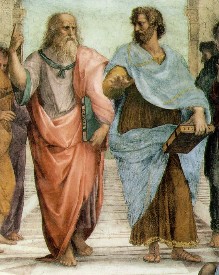
|
|
|
|

|
Jacques-Louis David, 1787 oil on canvas (Louvre) |
| Fall 2007 |
| MWF 9:05-9:55, Smith 341 |
| Dr. Annette Giesecke |
| (Office: 111 Jastak-Burgess Hall, 11:10-12 by appointment, x0545, alg@udel.edu) |
| Texts: Plato. Symposium.
Kenneth Dover, ed. Cambridge UP: Cambridge (1980).
Tides
of War. Steven Pressfield, Bantam Books (2000)
Recommended texts: Oxford Grammar of Classical Greek
Course Aims: In the course of the semester, students will be introduced to the works of Plato, specifically the Symposium, and thereby to classical Greek prose style at its best. As the Symposium is set at a Greek drinking party, the text will afford us with the opportunity to discuss daily life in ancient Greece as well as various aspects of Socratean and Platonic philosophy. Requirements and Assessment: Class participation: 40%
Schedule of Classes:
August 29: course introduction
31: go over reading, review nouns
and cases
Sept. 5: HW: read through 173e3 7: HW: read through 174c4 10: HW: to line 174e2 12: HW: to line 175b3 14: HW: 177d6-178d1 17: HW: to 179b3 19: HW: to 180 21: HW: to 180c5 24: HW: to 181d1 26: HW: to 182a6 28: HW: 185c4-186b2 Oct. 1: HW: to 187 Oct 5. NO CLASS ,
Prof. at conference
8: HW: to 188 and then skip to 189a1-d1 10: HW: to 190d1 and prepare for quiz on material post-Eryximachus 12: HW: to 191c2 15-19: 191&192 24: HW for the 29th: aim for 194 31: Test re-do
Nov. 5: HW: jump to Agathon's speech 194e4-195c7 7: HW: jump to Socrates' (198b1-199a6) 9: HW: to 199d7 12 moving towards 200 14 keep reading through 200 16 HW: 200b9-d7, 201d1-202 19 21: NO CLASS 26: 202-203c4 28: HW: 203c5-204d1 30: HW: 212d3-213c5 Dec 3: HW: 215a4-d6
The Plot to Save Socrates - Things to look out for while reading: 1. Heron - who is he and what sorts of inventions is he credited with? 2. The Library at Alexandria and at Constantinople 3. Who is Jowett? and who is Hypatia? 4. On pages 223-225, what do we learn about Socrates'
views on truth and authorship?
. |
| Tides of War: Study Guide
1. Can you identify Socratic discourse in the opening chapters of the book? 2. What do we learn early on about the appearance and character of Socrates? 3. What do we learn about Alicbiades and his position at the Potidaean camp? 4. Pay attention to Polemides’ aunt’s participation in the Panathenaia. Keep track of subsequent references to the Panathenaia. 5. What are we told about the City Dionysia and Alcibiades? 6. What is revealed about the civic role and status of women – courtesans and wives? what of their education and participation in festivals (Panatheneia, City Dionysia, Eleusinian Mysteries)? 7. Take particular note of references to the great plague in Athens and its victims, including Pericles. 8. What arguments does Alcibiades make in favor of the Sicilian expedition? 9. Note descriptions of daily life: gymnasia, and theaters 10. We know what the Parthenon’s long-lost statue of Athena looks like because copies of tourist replicas of the statue have been found. What similar replica statues are mentioned in this book? 11. What is Nicias’ argument against participation in the war? 12. What are we told of Socrates and his daimon? 13. What is a herm? and what happens to herms in Athens prior to the Sicilian Expedition? 14. What were the repercussions of the herm incident? 15. Note the impact of the “Sicilian” lunar eclipse. 16. How is life in the quarries described? 17. What was the total cost of the Athenian loss at Syracuse? 18. What are we told about Spartan life, specifically attitudes towards commerce and empire? 19. What radical proposal does Alicibiades make with reference to Persia? 20. What is Lysander’s prediction regarding Alcibiades’ future actions? 21. Does this differ from what Alcibiades actually does? 22. What was the government of the 400 like in Athens? 23. What do we hear about Socrates’ demeanor in battle? 24. What is described as another Trojan War? 25. Who is Timandra? 26. How is Alcibiades received in Athens upon his return? 27. Does Alcibiades believe that peace in Greece is possible? 28. How did Pericles keep the city enthralled? 29. Note the description of Socrates as a bringer of happiness and prosperity 30. How does Darius enable Lysander to win the war? 31. Note the character of Lysander’s speech. Does it sound sophistic? 32. What atrocities did the Athenians commit in Thrace? 33. What horrific event took place at Arginousai?
|
| Honors Section Requirements: It will be expected that students enrolled in section 80 read slightly more each week than the members of section 10. Further, Honors students will be asked to contribute actively to the discussion of the text, and in preparation for such discussion, these students will be given an assignment of a "cultural/historical" nature (culminating in an in-class presenatation). |
| . |
|
|
|
|

|
"School of Athens"detail Raphael, 1511 (fresco) Stagna della Signatura, Vatican Palace, Rome |
Foreign Languages and Literatures Home Page
Department of Foreign Languages
and Literatures
325 Smith Hall, University of
Delaware, Newark DE 19716
(302) 831-6882